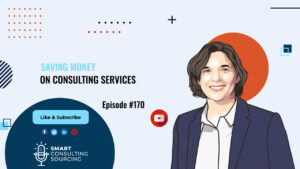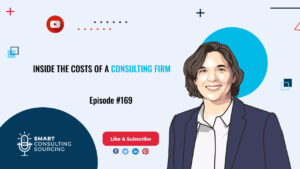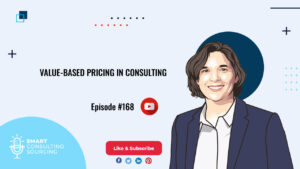Hello and welcome to episode 71 of our podcast: Smart Consulting Sourcing, THE podcast about Consulting Procurement.
My name is Hélène, and I’ll be your host today.
Each week I’ll give you the keys to better use, manage and source consulting services.
Welcome back! 2022 is here! I have lots of plans for this new year. I started a series of webinars last month (the next one will be on February 1st, and we will talk about the consulting sourcing process). And we are working on a new digital platform for consulting users & buyers.
So what are YOUR resolutions and plans for this new year?
Anyway, very happy to be back with a brand new episode. I’ve got a great show for you today.
But first, let’s go back to our last episode in December, where I talked about how to implement demanded management for consulting services.
We saw that demand management gives you an excellent opportunity to boost the transformation of your organization, but it requires some degree of centralization and transparency. The key to success is to build an agile demand management system to adjust the thresholds, the selection criteria, and the panel of providers regularly.
But this week, I wanted to convince you that you must involve all your stakeholders in choosing the right consulting services.
What are the fundamentals of change management?
But before that, let me remind you of the fundamental principles of change management. Change management is about changing behavior, simplifying procedures, and involving people in the change process if you want your project to succeed.
When you launch a project, be it a project involving consultants or not, managing change from a project perspective is necessary. You need to secure your leadership, convince your stakeholders that this project is essential, and align them on the same goal.
Who are the stakeholders exactly? They are the people who will be directly involved in or affected by that change. When it comes to consulting projects, this is the project sponsor, the project manager, and the different functions that the project will impact.
For instance, let’s imagine an industrial optimization project led by the global industrial director. He will be the project sponsor, but the factory leaders will be the main stakeholders.
Involve your stakeholders early in the process
It is obviously not mandatory to have all these stakeholders for each project… But, instead, you can focus on the main stakeholders, the ones who are directly impacted by the project or have the power to push or block a decision.
A good project manager will identify the main stakeholders in advance, and that’s one of his key roles. For instance, he has to secure leadership sponsorship, without which the project would never get started.
Also, what about this whole change management thing? Well it is his responsibility to identify people in each department who may be affected by the project.
So what does that mean for the sourcing process? Your first step is to define your needs and the project’s limits. That’s where you define the expectations for the project and align all the main stakeholders on these expectations.
They can provide insights into what’s going on in their department. They might also have an idea of a pain point that no one has considered. Keep in mind that many projects fail because expectations are not clearly defined, project goals are too broad, or change management is not integrated during the whole process.
You don’t want some stakeholders to be more interested in the success of their own department than the overall project’s objectives!
Your second step is to identify the potential suppliers & review proposals. Again, working with the main stakeholders can help smooth the process. Some of them might have powerful arguments for or against a given consulting firm. Besides, the scope (and therefore the expectations) is often fine-tuned during the proposal and negotiation phases. So, keeping them involved in the discussions is a good thing.
Reach out to all the functions impacted by the project
Now the project is launched, do you still need to involve the other stakeholders? 100 per cent yes. But how do you do that exactly?
Depending on the level of collaboration needed with the other functions, you may want to include them in your steering committee and your project teams.
For instance, the head of transformation needs to know what is happening in the Company to manage interdependencies. But he doesn’t need to be in the nifty details for each project.
But if you are working on an outsourcing project, you might want to find in the project team procurement people and representatives of whatever function will be outsourced. And they will both have representatives on the steering committee.
Not involving your stakeholders can be costly
Now let me tell you a true story. Back in the day, I was working at the Excellence Centre for one of the largest Utilities in Europe on gas grid construction. The Company launched a bottom-up project to reduce waste and shorten the time to connect clients to the grid.
The consultants and the project leaders did not include the Excellence Center in the project. Unfortunately, we were the official repository for the technical policies for the Company. When the consultants presented the results, we had to step in and rebuke almost half of the recommendations that were not compliant with either our internal policies or regulations. Ultimately, we had to restart the project to have decent results. The bottom line for the Company: lots of money spent for under-par results.
Finally, when you are closing a project, you should again include all the stakeholders to evaluate the success of the project and the performance of the consulting firm. It’s not uncommon for the project sponsor to have a different view than the project manager, and it is the same for the main stakeholders.
You cannot afford to leave any of them out, and they need to be kept informed because that is how you build trust and create buy-in in the long run.
In conclusion, a good project manager will do a lot to identify the main stakeholders and keep them involved in their projects. It is a key element of success. At each step of the process, including sourcing and project management, the project manager needs to assess which stakeholders to involve.
And that marks this end of our podcast, folks. Next week, I’ll talk about reverse auctions for consulting services. What are reverse auctions? How does that work? Does it apply to consulting services? So stay tuned.
Till then, stay safe and happy sourcing!
Don’t forget to follow me on Linkedin, Twitter, and Facebook if you enjoyed this podcast. I regularly publish on the topic.
If you have other questions about why and how to involve stakeholders in the sourcing of consulting services, remember you can contact me directly on Linkedin or by email at helene.laffitte@consultingquest.com. Because I am always game for a chat!
If you want more episodes or read the transcript of this podcast, you can find them on consulting.wiki
You can also have a look at our website consultingquest.com to know more about our book, our publications, and our services to improve your consulting sourcing.
Bye and see you next week! Au revoir!







